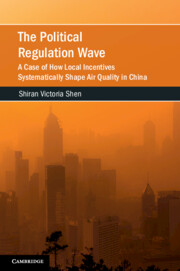Crossref Citations
This Book has been
cited by the following publications. This list is generated based on data provided by Crossref.
2022.
Books received.
The China Quarterly,
Vol. 250,
Issue. ,
p.
623.
2022.
Book Notes.
Law & Social Inquiry,
Vol. 47,
Issue. 3,
p.
e1.
Zhang, Hao
and
Zhang, Ye
2023.
Strong State, Weak Enforcement: Bureaucratic Forbearance and Regressive Consequences of China's Social Insurance Policies.
SSRN Electronic Journal,
Shen, Shiran Victoria
Wang, Qi
and
Zhang, Bing
2023.
When Fire Alarm Needs Police Patrol: Evidence from Regulating Firm-Level Pollutant Emissions in China.
SSRN Electronic Journal,
Buntaine, Mark T.
Komakech, Polycarp
and
Shen, Shiran Victoria
2024.
Social competition drives collective action to reduce informal waste burning in Uganda.
Proceedings of the National Academy of Sciences,
Vol. 121,
Issue. 23,
Shen, Shiran Victoria
2024.
Can Autocracy Handle Climate Change?.
PS: Political Science & Politics,
Vol. 57,
Issue. 4,
p.
487.
Chen, Haisong
Feng, Li
and
Sun, Xiaoyu
2024.
Beyond central-local relations: the introduction of a new perspective on China’s environmental governance model.
Humanities and Social Sciences Communications,
Vol. 11,
Issue. 1,
Shen, Shiran Victoria
Wang, Qi
and
Zhang, Bing
2025.
Regularized Campaigns as a New Institution for Effective Governance.
Policy Studies Journal,
Walgrave, Marthe
and
Soontjens, Karolin
2025.
Responsive nor responsible? Politicians’ climate change policy preferences and public opinion perceptions.
Environmental Politics,
p.
1.
Liu, Xinsheng
Ding, Taiping
Zhang, Youlang
and
Vedlitz, Arnold
2025.
Tainted trust: air pollution and political trust in China.
Environmental Politics,
Vol. 34,
Issue. 2,
p.
299.
Qu, Yingzi
2025.
Stakeholder Reactions to China’s Plastic Ban: Communication Gaps in Climate Governance.
Critical Arts,
p.
1.
Shen, Shiran Victoria
2025.
Political will as a source of policy innovation.
Policy Studies Journal,
Vol. 53,
Issue. 1,
p.
185.
Shen, Shiran Victoria
2025.
Governing policy experiments in Chinese cities: Lessons on effective climate mitigation.
Policy Studies Journal,



